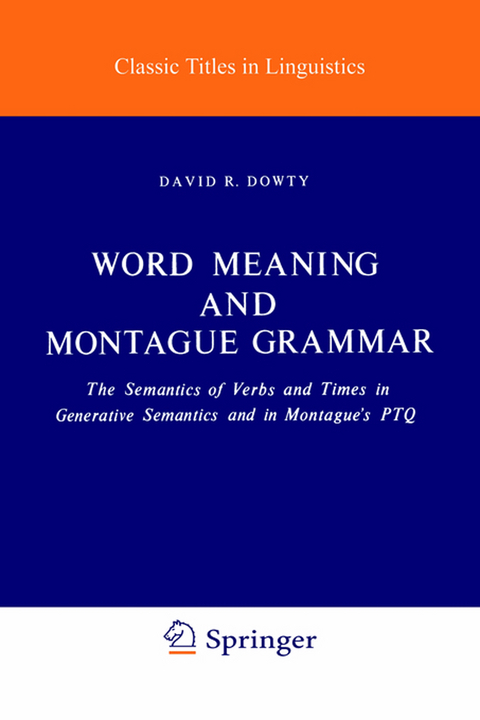
Word Meaning and Montague Grammar
Kluwer Academic Publishers (Verlag)
978-90-277-1009-3 (ISBN)
1. Montague’s General Theory of Languages and Linguistic Theories of Syntax and Semantics.- 1.1 The meaning of “Universal” in “Universal Grammar”.- 1.2 Syntax in the UG Theory and in Linguistic Theories.- 1.3 Semantics in UG.- 1.4 Interpretation by Means of Translation.- 1.5 Preliminaries to the Analysis of Word Meaning.- Notes.- 2. The Semantics of Aspectual Classes of Verbs in English.- 2.1 The Development of Decomposition Analysis in Generative Semantics.- 2.2The Aristotle-Ryle-Kenny-Vendler Verb Classification.- 2.3 An Aspect Calculus.- 2.4The Aspect Calculus as Restricting Possible Word Meanings.- Notes.- 3. Interval Semantics and the Progressive Tense.- 3.1 The Imperfective Paradox.- 3.2 Truth Conditions Relative to Intervals, not Moments.- 3.3 Revised Truth Conditions for BECOME.- 3.4 Truth Conditions for the Progressive.- 3.5 Motivating the Progressive Analysis Independently of Accomplishment Sentences.- 3.6 On the Notion of ‘Likeness’ Among Possible Worlds.- 3.7 Extending the Analysis to the “Futurate Progressive”.- 3.8 Another Look at the Vendler Classification in an Interval-Based Semantics.- Notes.- 4. Lexical Decomposition in Montague Grammar.- 4.1 Existing “Lexical Decomposition” in the PTQ Grammar.- 4.2 The General Form of Decomposition Translations: Lambda Abstraction vs. Predicate Raising.- 4.3 Morphologically Derived Causatives and Inchoatives.- 4.4 Prepositional Phrase Accomplishments.- 4.5 Accomplishments with Two Prepositional Phrases.- 4.6 Prepositional Phrase Adjuncts vs. Prepositional Phrase Complements.- 4.7 Factitive Constructions.- 4.8 Periphrastic Causatives.- 4.9 By-Phrases in Accomplishment Sentences.- 4.10 Causative Constructions in Other Languages.- Notes.- 5. Linguistic Evidence for the Two Strategies of LexicalDecomposition.- 5.1 Arguments that Constraints on Syntactic Rules Rule Out “Impossible” Lexical Items.- 5.2 Arguments that Familiar Transformations Also Apply Pre-Lexically.- 5.3 Pronominalization of Parts of Lexical Items.- 5.4 Scope Ambiguities with Almost.- 5.5 Scope Ambiguities with Adverbs: Have-Deletion Cases.- 5.6 Scope Ambiguities with Adverbs: Accomplishment Cases.- 5.7 Arguments from Re- and Reversative Un-.- 5.8 Accommodating the Adverb Scope Data in a PTQ Grammar.- 5.9 Overpredictions of the Generative Semantics Hypothesis.- 5.10 Concluding Evaluation.- Notes.- 6. The Syntax and Semantics of Word Formation: Lexical Rules.- 6.1 Montague’s Program and Lexical Rules.- 6.2 A Lexical Component For a Montague Grammar.- 6.3 Lexical Rules and Morphology.- 6.4 Lexical Rules and Syntax.- 6.5 Examples of Lexical Rules.- 6.6 Problems for Research in the Pragmatics and in the Semantics of Word Formation.- Notes.- 7. The Syntax and Semantics of Tenses and Time Adverbials in English: An English Fragment.- 7.1 The Syncategorematic Nature of Tense-Time Adverbial Interaction.- 7.2 Rules for “Main Tense” Adverbials.- 7.3 Aspectual Adverbials: For an Hour and In an Hour.- 7.4 The Syntactic Structure of the Auxiliary.- 7.5 The Present Perfect.- 7.6 Negation.- 7.7 An English Fragment.- Notes.- 8. Intensions and Psychological Reality.- Notes.- References.
| Erscheint lt. Verlag | 31.10.1979 |
|---|---|
| Reihe/Serie | Studies in Linguistics and Philosophy ; 7 |
| Zusatzinfo | XXV, 418 p. |
| Verlagsort | Dordrecht |
| Sprache | englisch |
| Maße | 155 x 235 mm |
| Themenwelt | Geisteswissenschaften ► Philosophie ► Sprachphilosophie |
| Geisteswissenschaften ► Sprach- / Literaturwissenschaft ► Sprachwissenschaft | |
| Sozialwissenschaften | |
| ISBN-10 | 90-277-1009-0 / 9027710090 |
| ISBN-13 | 978-90-277-1009-3 / 9789027710093 |
| Zustand | Neuware |
| Haben Sie eine Frage zum Produkt? |
aus dem Bereich


